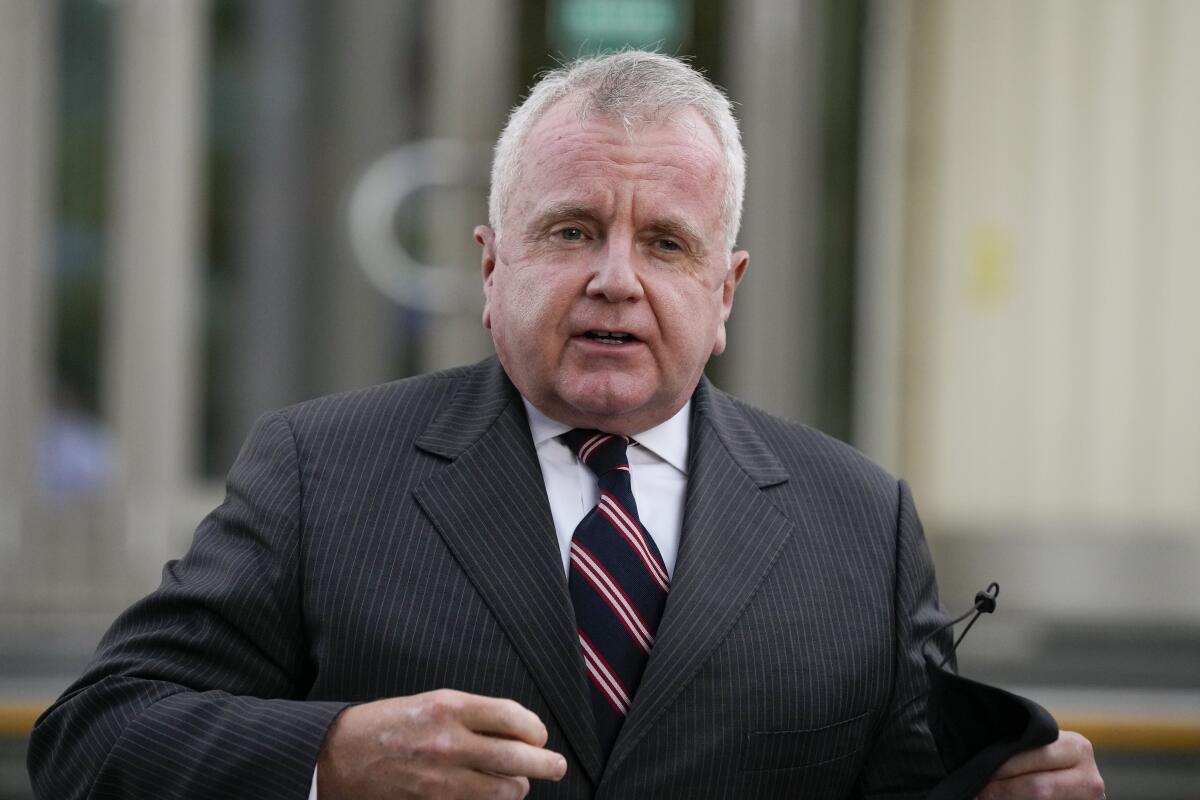U.S. ambassador to Russia leaves post as Ukraine war drags on

WASHINGTON — The U.S. ambassador to Russia, John Sullivan, ended his tenure as America’s top diplomat in Moscow on Sunday after nearly three years, spanning the Trump and Biden administrations, and will retire from a lengthy career in government service.
His departure, which comes in the midst of an increasingly serious crisis over Russia’s war in Ukraine as well as disputes over detained Americans in Russia, had been expected this fall as he reached the usual length of time for U.S. ambassadors. But it was sped up due to family medical issue, according to people familiar with the matter who spoke on condition of anonymity because of the private nature of the situation.
“Ambassador Sullivan’s departure is planned and part of a normal diplomatic rotation,” the State Department said. “He has served a full tenure as U.S. ambassador to Russia, managing one of the most critical bilateral relationships in the world during unprecedented times.”
The department added: “The U.S. will continue to condemn unequivocally the Kremlin’s aggressive war against Ukraine and remain steadfast in our commitment to supporting Ukraine’s sovereignty and territorial integrity.”
Since Russia invaded Ukraine in February, the war has slowed to a grind with both sides trading combat strikes and small advances in the east and south. Both Russia and Ukraine have seen thousands of troops killed and injured, and Russia’s bombardment of cities has killed countless innocent civilians.
Elizabeth Rood, the deputy chief of mission to Russia, will be the top U.S. diplomat in Moscow until a successor nominated by President Biden replaces Sullivan.
A Boston native and big ice hockey fan who brought his skates and equipment when he left for Russia, Sullivan had returned to Moscow from a summer break just last week and had attended former Soviet President Mikhail Gorbachev’s memorial service Saturday.
Sullivan took the helm of the Moscow embassy at a particularly difficult time in U.S.-Russia relations, which have grown only worse. He struggled to hold together a diplomatic mission dramatically reduced in staff as Washington and Moscow carried out an increasingly severe series of tit-for-tat expulsions.
Sullivan spoke frequently of his frustrations about deteriorating conditions for U.S. diplomats in Moscow, especially after Russian restrictions on American and local personnel forced major reductions in staffing.
His four-decade public service career included postings in Republican administrations as deputy secretary of State and senior positions in the departments of Justice, Defense and Commerce.
Sullivan was deputy secretary of State when he was nominated by President Trump and confirmed by the Senate with unusually strong bipartisan support to be ambassador to Russia in December 2019. Biden asked him to remain in the post when Biden took office last year.
He had been the lead U.S. official in talks with Russia on counterterrorism and strategic security and testified in his Senate confirmation hearing that Russian efforts to undermine democracies must be combated.
Sullivan told senators that he would be “relentless” in confronting Russia over election interference, hostile moves against neighbors such as Georgia and Ukraine, human rights abuses and violations of arms control agreements.
His time as the State Department’s No. 2 official was not without controversy.
Sullivan was the one who delivered the news to Marie Yovanovitch, the U.S. ambassador to Ukraine, that Trump had lost confidence in her and that she was being recalled early from the post.
Sullivan told the Senate Foreign Relations Committee that he was given no other explanation for Yovanovitch’s removal and told her that he did not believe she had done anything to warrant her recall.
Asked why he did not oppose Yovanovitch’s ouster or speak out publicly on her behalf at the time, Sullivan said ambassadors serve at the pleasure of the president and can be removed with or without cause. He noted that his uncle, a former U.S. ambassador to Iran, had been recalled early from Tehran by the Carter administration for what the family believed to be unfair political reasons.
“When the president loses confidence in the ambassador, right or wrong, the ambassador goes,” Sullivan said.
More to Read
Sign up for Essential California
The most important California stories and recommendations in your inbox every morning.
You may occasionally receive promotional content from the Los Angeles Times.










